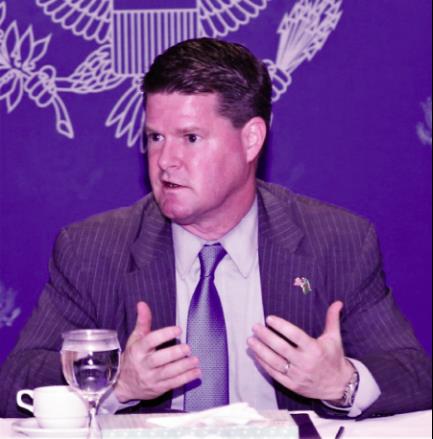The United States warns no country should object in improving of cooperation in the areas of defense between Bangladesh and the USA. If anybody objects to that it would be a matter of concern to Washington.
The US assistant secretary of defense for Indo-Pacific security affairs Randall G Schriver came up with the views while speaking at a press briefing before wrapping up his visit to Dhaka on December 4.
The Assistant Secretary said both Bangladesh and the USA want a strong cooperation in the areas of defense out of mutual interests. “if anybody objects to that it would be a matter of concern. No one should object in improving our relationship,” he vowed.
Randall G Schriver visited Dhaka on December 3-4 with an aim to discuss about two defense deals and enhance cooperation in areas of defense and other sectors.
During the visit, the Pentagon official held meetings with Prime MJinister’s security affairs adviser Tarique Ahmed Siddique and international affairs adviser Gowher Rizvi, and top military officials at the Bangladesh Army Headquarters and the Armed Forces Division.
Schriver said he discussed with the Bangladesh officials on the US’s intent for advanced defense relations driven by mutual interests with signing two proposed agreements – General Security of Military Information Agreement (GSOMIA) and Acquisition and Cross-Servicing Agreement (ACSA).
“These are foundational and enabling agreements to drive to move this relationship. Signing these two agreements would help open opportunities for strengthening cooperation on sharing information and sensitive technology,” he noted.
Responding to a question on GSOMIA and ACSA, Schriver said they want to do these in a correct way in terms of making sure that they have mutual confidence and both sides see benefits. “We’re interested in making sure it’s done correctly and properly.”
He said the “sense of urgency” relates to the fact that they want to do more and want to advance the defense relationship with further cooperation. “So, our urgency just comes from a desire to move this relationship forward and these are important steps.”
The Bangladesh side wanted mutual cooperation on using western and the US platforms in the areas of defense, he said, adding that both sides were engaged in supporting peacekeeping, counterterrorism, maritime security, and cyber security.
On Indo-Pacific Strategy (IPS), the Assistant Secretary said the IPS supports free, fair, and reciprocal trade, open investment environments, good governance, and freedom of the seas are goals shared by all who wish to prosper in a free and open future.
He said, “the IPS is our ‘whole-of-government’ approach to protect and advance shared principles in support of a free and open Indo-Pacific, in which sovereign and independent nations like Bangladesh can prosper in freedom and peace.”
Schriver said the government of Bangladesh should view the Indo-Pacific Strategy as an open opportunity to advance many of Bangladesh’s national and international objectives.
“Indo-Pacific Strategy is not a direct counter to China or China’s Belt and Road Initiative (BRI). So, we expect Bangladesh will have good relations with its neighbors and we’ve no issue with Bangladesh in improving relations with other countries,” said the Assistant Secretary.
On Rohingya issue, the US defense official laid emphasis on durable solution to Rohingya crisis with conditions appropriate and conducive for peaceful return of Rohingyas that needs to be sustained.
“We use the means that are available to us,” he said adding that they will also continue to support Bangladesh which has provided temporary shelter to over 1.1 million Rohingyas.
The US senior official mentioned they have a very limited defense engagement or military-to-military engagement with Myanmar.

